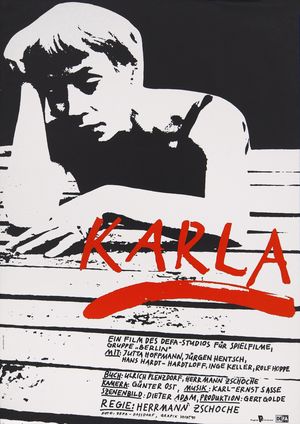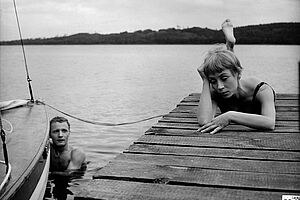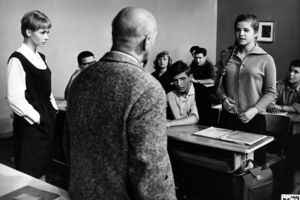Karla
Regie: Herrmann Zschoche, 128 Min., Schwarz-Weiß, Spielfilm
Deutsche Demokratische Republik (DDR)
DEFA-Studio für Spielfilme, 1965 - 1990
- Film-/Videoformat
- 35 mm
- Länge in m
- 3641
- Sonstiger Titel
- Wer zuletzt lächelt
- Englischer Titel
- Carla
- Premierendatum
- Anlaufdatum

(R: Herrmann Zschoche, 1965/1990) Grafiker: Voigt
Kurzinhalt (Deutsch)
Karla tritt nach Abschluss der Universität mit großen Ambitionen eine Lehrerstelle in einer Kleinstadt im Norden der DDR an. Sie möchte den Kindern nicht nur Fakten vermitteln, sondern sie vor allem zu selbstständigem Denken anregen. Mit Direktor Hirte versteht sie sich anfangs recht gut. Doch ihre Ideale stoßen auf Unverständnis - auch bei den Schülern, die längst wissen, was zu sagen ist und was man besser verschweigt. Ihr unkonventionelles Verhalten, sie hat auch noch eine Beziehung zu dem "Aussteiger" Kaspar, fällt unangenehm auf. Nach einer Niederlage passt sich Karla an. Kurz vor dem Abitur begehrt sie jedoch auf, sagt ihren Schülern die Meinung. Am Ende des Schuljahres wird sie in eine andere Schule versetzt, Kaspar begleitet sie.
Filmtext: Karla. Der alte Mann, das Pferd, die Straße. Texte zu Filmen von Ulrich Plenzdorf. Berlin: Henschelverlag 1978. Auch in: Ulrich Plenzdorf: Filme 2. Rostock: Hinstorff Verlag 1988.
(Quelle: Das zweite Leben der Filmstadt Babelsberg. DEFA-Spielfilme 1946-1992)

(R: Herrmann Zschoche, 1965/1990) Fotograf: Eberhard Daßdorf

(R: Herrmann Zschoche, 1965/1990) Fotograf: Eberhard Daßdorf
Filmstab
- Regie
-
- Herrmann Zschoche
- Drehbuch
-
- Ulrich Plenzdorf
- Herrmann Zschoche
- Szenarium
-
- Ulrich Plenzdorf
- Herrmann Zschoche
- Kamera
-
- Günter Ost
- Siegfried Mogel (Kameraführung)
- Schnitt
-
- Brigitte Krex
- Darsteller
-
- Jutta Hoffmann (Karla)
- Jürgen Hentsch (Kaspar)
- Hans Hardt-Hardtloff (Direktor Hirte)
- Inge Keller (Schulrätin Janson)
- Gisela Morgen (Frau Wenndorf)
- Herwart Grosse (Lehrer Jott)
- Rolf Hoppe (Lehrer Eifler)
- Jörg Knochée (auch: Knoche) (Rudi)
- Klaus-Peter Pleßow (Uwe Wenndorf)
- Jürgen Krumrey (Der Kleine)
- Heidemarie Schneider (Erna)
- Dieter Wien (Lenke)
- Harald Moszdorf (Lehrer Karstadt)
- Fred Delmare (Hausmeister)
- Peter Sturm (Hartmann)
- Anne-Kathrein Kretzschmar (Barbara)
- Karin Steinbach (Rita)
- Regine Albrecht (Monika)
- Michael Höhne (Dieter)
- Else Sanden (Wirtin)
- Brigitte Lindenberg (Sekretärin)
- Regieassistenz
-
- Erhard Bittner
- Kameraassistenz
-
- Dietram Kleist
- Eberhard (auch: Franz-Eberhard) Daßdorf
- Szenenbild
-
- Dieter Adam
- Dramaturgie
-
- Manfred Fritzsche
- Manfred Kieseler
- Musik
-
- Georg Katzer
- Karl-Ernst Sasse (Rekonstruktion 1990)
- Ton
-
- Wolf-Joachim Preugschat
- Konrad Walle (Tonmischung)
- Kostüm
-
- Luise Schmidt
- Maske
-
- Christel Schwarzer
- Karl-Heinz Wolter
- Requisite
-
- Herbert Rother
- Produktionsleitung
-
- Gert Golde
- Aufnahmeleitung
-
- Manfred Peetz
- DEFA-Fotograf
-
- Eberhard (auch: Franz-Eberhard) Daßdorf
Auszeichnungen
- 40. Internationale Filmfestspiele Berlin (1990): Lobende Erwähnung der FIPRESCI und INTERFILM (int. evang. Filmfjury) für die Gruppe der acht Verbotsfilme aus der DDR
Kurzinhalt (Englisch)
Karla Blum, a young teacher, leaves universtiy with good marks and eagerly takes on a school post where she is to teach. Karla is the type of person to whom it is more important to have an opinion of one's own and not to put up with simplistic solutions than to teach parrot-like pupils with hardly any minds of their own. But many of her Form 12 A pupils no longer know how to ask questions, to contradict or to look for solutions independently. The principal, a man in his late fifties marked by the war and bitter about his post-war experiences, sticks to the motto: the simpler matters are, the clearer they become. They quite like each other, but their differing attitudes to authority, truth etc., still have to face the test of realtiy. On the one hand, there is the school inspector who keeps a dubious system of moving or not moving pupils to the next form. On the other, there are the pupils who in part are already too adjusted and apathetic. Karla slowly and imperceptibly comes to give up her ideals and her own uncompromising attitude. Now, they all are satisfied - both teachers and pupils. Everything inches along in its familiar old rut. But the young teacher suddenly realizes where all this convenience and adjustment leads to. She rediscovers her contrariness, and thereby her own personality. The price she pays for this, however, is high: at the end of the school year, she is forcibly transferred to another post.
Source: Progress Film-Verleih
Kurzinhalt (Weitere Sprachen)
Finita l'università, Karla accetta una cattedra in un paesino nella parte settentrionale della RDT con l'idea di non limitarsi a insegnare contenuti, ma stimolare i ragazzi a pensare in maniera autonoma. I suoi ideali, tuttavia, non sono ben visti, proprio come la sua relazione con l'emarginato Kaspar. Dopo una serie di sconfitte, Karla sembra pronta ad adeguarsi, ma prima della maturità si ribella, dicendo agli alunni ciò che pensa. Alla fine dell'anno scolastico verrà trasferita in un'altra scuola e Kaspar la seguirà. (Italienisch)



